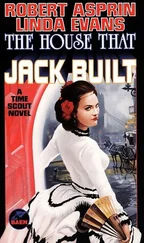O. Douglas - The House That is Our Own
Здесь есть возможность читать онлайн «O. Douglas - The House That is Our Own» — ознакомительный отрывок электронной книги совершенно бесплатно, а после прочтения отрывка купить полную версию. В некоторых случаях можно слушать аудио, скачать через торрент в формате fb2 и присутствует краткое содержание. Жанр: unrecognised, на английском языке. Описание произведения, (предисловие) а так же отзывы посетителей доступны на портале библиотеки ЛибКат.
- Название:The House That is Our Own
- Автор:
- Жанр:
- Год:неизвестен
- ISBN:нет данных
- Рейтинг книги:3 / 5. Голосов: 1
-
Избранное:Добавить в избранное
- Отзывы:
-
Ваша оценка:
- 60
- 1
- 2
- 3
- 4
- 5
The House That is Our Own: краткое содержание, описание и аннотация
Предлагаем к чтению аннотацию, описание, краткое содержание или предисловие (зависит от того, что написал сам автор книги «The House That is Our Own»). Если вы не нашли необходимую информацию о книге — напишите в комментариях, мы постараемся отыскать её.
The House That is Our Own — читать онлайн ознакомительный отрывок
Ниже представлен текст книги, разбитый по страницам. Система сохранения места последней прочитанной страницы, позволяет с удобством читать онлайн бесплатно книгу «The House That is Our Own», без необходимости каждый раз заново искать на чём Вы остановились. Поставьте закладку, и сможете в любой момент перейти на страницу, на которой закончили чтение.
Интервал:
Закладка:
O. Douglas
The House That is Our Own

Books
OK Publishing, 2020
musaicumbooks@okpublishing.infoTous droits réservés.
EAN 4064066310134
Table of Contents
CHAPTER I
CHAPTER II
CHAPTER III
CHAPTER IV
CHAPTER V
CHAPTER VI
CHAPTER VII
CHAPTER VIII
CHAPTER IX
CHAPTER X
CHAPTER XI
CHAPTER XII
CHAPTER XIII
CHAPTER XIV
CHAPTER XV
CHAPTER XVI
CHAPTER XVII
CHAPTER XVIII
CHAPTER XIX
CHAPTER XX
CHAPTER XXI
CHAPTER XXII
CHAPTER XXIII
CHAPTER XXIV
CHAPTER XXV
CHAPTER XXVI
CHAPTER XXVII
CHAPTER XXVIII
CHAPTER XXIX
CHAPTER XXX
To you, J. B., who, with little liking for mild
domestic fiction, read patiently my works,
blue-pencilling when you had to, praising
when you could, encouraging always, I
dedicate this story, which you are not here to
read, of places you knew and loved.
The house from which the heavens are fed.
The old strange house that is our own,
Where tricks of words are never said,
And Mercy is as plain as bread,
And Honour is as hard as stone.
G. K. Chesterton
CHAPTER I
Table of Contents
My deepest sense, how hard true sorrow hits.
The Comedy of Errors
Kitty Baillie threw down the book she was reading and yawned inelegantly.
“Why,” she asked, “does anyone ever read a thriller? They leave such a nasty sticky taste in one’s mind.”
“They leave me scared stiff,” said her companion. “But then, I’m a feeble soul.”
She did not look a feeble soul, this Isobel Logan, as she stood smiling down at her friend, and Kitty Baillie, who had sat herself down on the edge of her bed, said:
“Feeble! You? Why, you look like a pillar of the British Empire.”
Isobel, unimpressed by this tribute, continued. “Why read thrillers if you don’t like them?”
“Oh, just to make a change. I’ve been reading nothing but history lately.”
“Yes. I know. I like the book you lent me last— Henrietta Maria . That was more interesting than any novel. But how they could have beheaded that little gentle Charles, I don’t know!”
“Well,” said Kitty judicially, “he was terribly obstinate: dour to a degree.”
“As to that, if every obstinate person was beheaded the world would be a shambles. Kitty, if you bounce like that, you’ll make your mattress sag.”
“It sags already,” said Kitty. “I do hate to feel the bones of a bed.”
“As bad as that? Mine is quite good, and think what I weigh compared to you.”
“Oh, you needn’t throw your superior height in my face. Am I nothing but low and little? (You know, you and I would make quite a good Helena and Hermia, though I’m too old for the part.) But let me tell you, my girl, you’re much too easily pleased with everything. The world will simply make a footstool of you if you ask so little from it.”
Isobel made no reply, and Kitty gave an impatient jump on her maligned mattress, and continued, “I’m sick of this place.”
“It’s quite good as hotels go,” Isobel reminded her. “It’s well kept, the cooking isn’t at all bad, they keep good fires, and the servants stay. Some of them have been here ever since I came—how many years is that?—five—six?—and that in itself is a testimonial to the place. It’s convenient too for tubes and buses, and near the Park. Perhaps, as you say, I’m too easily pleased, but I confess to a weakness for the Queen’s Court Private Hotel.”
“Oh, it’s all right,” said Kitty; “it’s simply that I’m sick of it.”
She sat staring before her with a look of misery in her dark eyes, and Isobel, who knew her in these moods, turned her back and looked out of the window.
It was not an inspiriting outlook, a sort of court, into which the rain was falling in the peculiarly stark way March rain often falls. A van was being unloaded down below, and a quantity of damp straw lay about, a small dog snuffling amongst it. A message-boy relieved the tedium by shrill whistling, while a street-singer with a blatantly black eye bawled:
I am so lonely, years are so long,
I want you only, you and your song.
“Isobel!”
The girl turned round.
“I didn’t mean to grumble and be ungrateful,” Kitty said. “I haven’t forgotten how thankful I was for this refuge when I came back to England last October. All I asked then was to be allowed to lean back and do nothing. I didn’t even think. I could read and I could listen, that was about all; I went about in a sort of dream.”
“You had had such a long time of strain,” said Isobel’s quiet voice.
“Two years,” said Kitty. “Two years watching my dear Rob suffer and die; wandering from hotel to hotel, from one cure to another. The only comfort was that Rob kept hopeful to the end, always sure that the next place, the next doctor, would cure him. He never knew how difficult it all was. Those foreign hotels are terrified of having a death on the premises, and when they saw Rob they sometimes would hardly let us in. And you couldn’t blame them, they had to look after their own interests. Anyway, it didn’t matter, for I managed to keep it from Rob: he had enough to bear without that.”
“You didn’t think of bringing him home when you found he was getting no better?”
Kitty shook her head.
“He didn’t want to come. It was easier for him being ill among strangers. I quite understood that. He had been rather a figure in his own set, good to look at, good at everything he tried, one of those buoyantly happy and successful people—how could he go creeping back to the pity of his friends? ‘ Poor Rob! Have you seen him? Isn’t it tragic? ’ Banishment was better than that. He clung to me, poor darling, and that stiffened my back. Before, he had always been the one who did things. I followed, squaw-like, behind. Now I had to stand in front and wrestle with hotel-managers and foreign doctors; worst of all, I had to manage the money. If I had had a brother—but both Rob and I were only children, and almost relationless. But I managed somehow, though not well, and anyway, I never worried Rob with my difficulties. And the only really horrible hotel-manager was the last. Rob had finished with it all by that time, thank God, and that meant that I was past caring much what happened to me. But the little French doctor was all that was kind, helped me with the formalities, arranged everything, and started me on my way home.”
Isobel remembered that October evening when, coming in from some party or mild junketing, she had noticed in the entrance-hall a forlorn-looking little black-clad figure.
Kitty went on. “And you were the first person I met when I got here. You came in behind me, your face rosy with the frosty air, and looking so large and golden that it was if the sun had suddenly risen! It had been a miserable crossing; I was chilled to the bone, tired, and sad beyond measure, but when you crinkled up your eyes and smiled at me, I felt, for the first time in months, a slight lifting of the heart. No-one had smiled at me for so long. Nothing but looks of pity and commiseration had come my way. And how I resented them! I tried so hard not to be sorry for myself, for self-pity is a loathsome thing. Rob never pitied himself—or me either. He and I were one in a way few married people, I imagine, are, and we were fighting together to win through. Even that last day, when all the strength he had seemed to go quite suddenly, when he could hardly speak above a whisper, and every breath was an effort, he tried to say something to me, I couldn’t catch what, about what we’d do when he was better—and smiled.”
Читать дальшеИнтервал:
Закладка:
Похожие книги на «The House That is Our Own»
Представляем Вашему вниманию похожие книги на «The House That is Our Own» списком для выбора. Мы отобрали схожую по названию и смыслу литературу в надежде предоставить читателям больше вариантов отыскать новые, интересные, ещё непрочитанные произведения.
Обсуждение, отзывы о книге «The House That is Our Own» и просто собственные мнения читателей. Оставьте ваши комментарии, напишите, что Вы думаете о произведении, его смысле или главных героях. Укажите что конкретно понравилось, а что нет, и почему Вы так считаете.




![Альфред Ван Вогт - Вечный дом / The House that Stood Still [= А дом стоит себе спокойно…; Обитель вечности]](/books/276568/alfred-van-vogt-vechnyj-dom-the-house-that-stood-thumb.webp)







